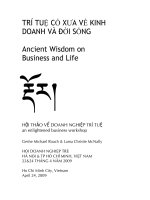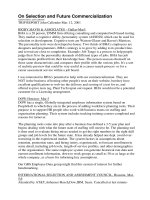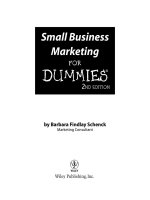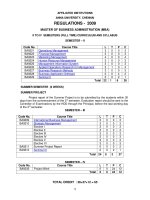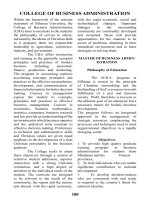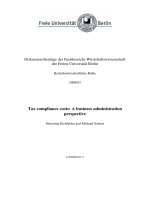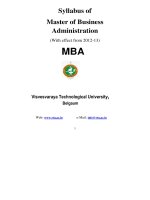International Programme on Business Administration Erasmus University pdf
Bạn đang xem bản rút gọn của tài liệu. Xem và tải ngay bản đầy đủ của tài liệu tại đây (19.22 KB, 5 trang )
International Programme on Business Administration
Erasmus University
BAP 56 - MICROECONOMICS AND MARKETS
Microeconomics is the branch of economics that deals with the activities of the
individual units of the economy. The traditional domain of microeconomics is the
marketplace where the focus is on the behaviour of consumers and firms and the
interaction between the two under different assumptions about the market structure
(perfect competition, monopoly etc.). The aim of this course is to provide students
with the tools from intermediate microeconomics, game theory, and industrial
organisation that they need to make sound managerial decisions. More in detail, the
objective of this series of lectures is to develop a fundamental understanding of the
economic model of individual and market behaviour. The course will provide
indications of how this model is used to gain theoretical insights about the working of
the economy and the effects of economic policy; and how it is used to derive testable
predictions that a manager could use in order to take effective and efficient decisions.
In the course special emphasis is given to market structure and the environment in
which firms operate.
Coordinator: prof. Dr. Maarten C.W. Janssen
Instructors: Dr. Jose-Luis Moraga, Dr. Emanuela Sciubba, Drs. Ewa Mendys, Drs.
Rob van der Noll, Prof. dr. ing. F.A.J. van den Bosch and others to be announced.
Format of the Course: weekly lectures (2 hours, weeks: 49, 50, 51, 2, 3, 4, 5, 6, 7, 8)
and weekly practicums (in 4 groups, 2 hours, weeks: 49, 50, 51, 2, 3, 4, 5, 6, 7, 8).
Exam: Multiple choice test in week TO BE ADDED
Course Assessment: Fully determined by the final exam
Web-site for the Course: Please check the following web-site regularly, as
announcements and course materials will be posted there by instructors
/>Essential Readings
The textbook for this course is:
• Michael R. Baye: "Managerial Economics and Business Strategy", Mc-Graw Hill
Higher Education, 2000. (3
rd
edition)
In addition, the following readings constitute course material:
• Stigler, G.J. (1961): "The Economics of Information", Journal of Political
Economy 69, 213-225.
• Janssen, M. and J. L. Moraga (2000): "Pricing, Consumer Search and the Size of
Internet Markets" Tinbergen Institute Discussion Paper TI 2000-042/1. (Non-
technical summary available from />summary.pdf)
• McAfee, R. P. and McMillan, J. (1996): "Competition and Game Theory",
Journal of Marketing Research 33(3), 263-8.
• Porter, M.E. (1991): "Towards a dynamic theory of Strategy", Strategic
Management Journal 12, 95- 117.
This article complements chapter 6 and 7 and addresses issues raised in chapter 12
and 13.
• van den Bosch, F.A.J., H.W. Volberda, M. de Boer (1999): "Coevolution of firm
absorptive capacity and knowledge environment: organizational forms and
combinative capabilities", Organization Science 10(5), 551-568.
This article complements chapter 6 by addressing a knowledge-based theory of the
firm and combines firm and industry levels of analysis. As knowledge is activated
by information, this paper is also related to chapter 12.
• van den Bosch, F.A.J. and A.P. de Man (1994): "Government’s Impact on the
Business Environment and Strategic Management", Journal of General
Management 19(3), 50-59.
This article illustrates chapter 13.
The following case-studies will be discussed:
• Bundling: Harvard Business School case study 9-191-177
• Starbuck Corporation: p. c.160-c.175 in: Hill & Jones (1998)
• Transformation at Harley-Davidson, p. 325-341, in: Hill & Jones (1998)
• Amazon.com, p. c.107-c.122, in: Hill & Jones (1998)
Overview of Lectures
Lecture 1 (Monday 4
th
December - Dr. Emanuela Sciubba)
Market Forces: Supply and Demand; and Quantitative Demand Analysis
After a brief introduction on microeconomics and markets, this lecture covers the
essentials of supply and demand, including demonstration problems that help the
students work through the theory. Price ceilings and price floors, as well as own-price
elasticity, income elasticity and cross-price elasticity are also covered.
Readings: Baye, chapters 1 (complementary), 2 (essential) and 3 (pp. 69-87 essential;
pp. 88-112 complementary).
Lecture 2 (Monday 11
th
December – Dr. Emanuela Sciubba)
The Theory of Individual Behaviour
This lecture provides a basic model of individual behaviour that enables the manager
to understand the impact of various managerial decisions on the actions of consumers.
The underlying assumptions of consumer theory help to obtain a better understanding
of demand theory.
Readings: Baye, chapter 4.
Lecture 3 (Monday 18
th
December – Dr. Emanuela Sciubba)
The Production Process and Costs
This lecture provides the basic tehory of production and costs. We cover isoquants,
isocosts, the short-run versus the long-run, average product, marginal product, value
of marginal product and the profit maximising input usage. A graphical presentation
of cost curves is also provided, together with a discussion of the theory of economies
of scale.
Readings: Baye, chapter 5.
Lecture 4 (Monday 8
th
January – Dr. Jose-Luis Moraga)
Perfect competitive markets, monopolies and monopolistically competitive markets
This lecture discusses the optimal decisions of managers in three paradigmatical
frameworks: (i) perfect competition, (ii) monopoly, and (iii) monopolistic
competition. Understanding these market structures is a crucial step to be prepared to
manage a firm that operates in virtually any environment.
Readings: Baye, chapter 8 and Stigler (1961)
Lecture 5 (Monday 15
th
January – Dr. Jose-Luis Moraga)
Game Theory
In this lecture we will develop general tools that help managers to make decisions in
oligopolisitic markets, including what prices to charge, how much and what type of
advertising to use, what markets to enter etc. The basic tool we will use to analyze
such questions is game theory. This tool can be further employed to analyze decisions
within the firm, such as wage bargaining.
Readings: Baye, chapter 10 and McAfee, McMillan (1996)
Lecture 6 (Monday 22
nd
January – Dr. Jose-Luis Moraga)
Oligopoly
This lecture builds upon the previous session to answer a variety of questions related
to managers' decision making. In particular, it addreses selection of prices, quantities,
price discrimination, group pricing, bundling and versioning, and price matching
policies.
Readings: Baye, chapters 9 and 11 and Janssen, Moraga (1999)
Lecture 7 (Monday 29
th
January – Prof. dr. ing. F.A.J. van den Bosch)
The organization of the firm
Readings: Baye, chapter 6 and Van den Bosch, Volberda & De Boer (1999)
Lecture 8 (Monday 5
th
February – Prof. dr. ing. F.A.J. van den Bosch)
The nature of industry
Readings: Baye, chapter 7 and Porter (1991)
Lecture 9 (Monday 12
th
February – Prof. dr. ing. F.A.J. van den Bosch)
The Economies of Information
Reading: Baye, chapter 12 (excluding p. 462-474) and Van den Bosch, Volberda, De
Boer (1999)
Lecture 10 (Monday 19
th
February – Prof. dr. ing. F.A.J. van den Bosch)
A Manager’s Guide to Government in the market place
Readings: Baye, chapter 13 and Van den Bosch & De Man (1994)
Overview of Practicums
Practicum 1 (Friday 8
th
December - E.Mendys / R. van der Noll)
Market Forces: Supply and Demand; and Quantitative Demand Analysis
Selected problems from Baye, chapter 3.
Practicum 2 (Friday 15
th
December - E.Mendys / R. van der Noll)
The Theory of Individual Behaviour
Selected problems from Baye, chapter 4
Practicum 3 (Friday 22
th
December - E.Mendys / R. van der Noll)
The Production Process and Costs
Selected problems from Baye, chapter 5
Practicum 4 (Friday 12
th
January - E.Mendys / R. van der Noll)
Perfect competitive markets, monopolies and monopolistically competitive markets
Selected problems from Baye, chapter 8
Case study: Bundling
Practicum 5 (Friday 18
th
January – E.Mendys / R. van der Noll)
Game Theory
Selected problems from Baye, chapter 10
Practicum 6 (Friday 26
th
January– E.Mendys / R. van der Noll)
Oligopoly
Selected problems from Baye, chapters 9 and 11
Case study: Bundling
Practicum 7 (Friday 2
th
February – to be announced / to be announced)
The organization of the firm
Selected problems from Baye, chapter 6
Case study: Starbucks Corporation
Practicum 8 (Friday 9
th
February – to be announced / to be announced)
The nature of industry
Selected problem from Baye, chapter 7
Case study: Transformation of Harley-Davidson
Practicum 9 (Friday 16
rd
February – to be announced / to be announced)
The Economies of Information
Selected problems from Baye, chapter 12, related to p.439-461
Case study: Amazon.com
Practicum 10 (Friday 23
rd
February – to be announced / to be announced)
A Manager’s Guide to Government in the market place
Selected problem from Baye, chapter 13
Example of multiple choice questions.

